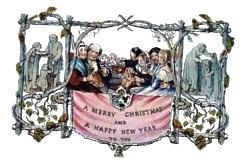
|
Home |
Issues | The Daily Star
Home
|
|
|
Fun Facts about Christmas
Throughout the Middle Ages, there was an adaptation of pagan festivals into the Christian calendar. In the 4th century, the religious leaders declared December 25, which coincided with the pagan feast of the Sol Invictus ("unconquered sun", after the state-supported sun god), to be the birth-date of Christ. Customs from the feast of Saturnalia, which actually took place around December 23, such as the exchange of gifts and general merrymaking, were incorporated into the Christmas celebration, so that it eventually became a sort of composite Christian celebration. Whatever the origins, there's no denying that the whole atmosphere of togetherness and loving and giving, which settles down during Christmas, makes it such a special occasion. Here's wishing all our readers a very Merry Christmas.  In the cards In the cards"You cannot reach perfection though you try however hard to there's always one more friend or so you should have sent a card to," wrote Richard Armour. Sir Henry Cole knew exactly what the man was talking about, and so in 1843, he commissioned the artist John Callcott Horsely to paint a card showing the feeding and clothing of the poor. A centre panel displayed a happy family embracing one another, sipping wine and enjoying the festivities. Two batches totalling 2050 cards were printed and sold that year for a shilling each. Although the image, which showed a child drinking wine, raised a lot of eyebrows, the custom of sending cards on Christmas quickly caught on. The early cards were very lavish, decorated with fringe, silk and satin. Some were shaped liked fans and crescents; others were cut into the shapes of bells, birds, candles and even plum puddings. Some folded like maps or fitted together as puzzles; other squealed or squeaked. Suddenly e-cards seem so mundane, don't they?
By The Girl Next Door Let's all go 'Meh’ The expression of indifference or boredom has gained a place in the Collins English Dictionary after generating a surprising amount of enthusiasm among lexicographers. Publisher HarperCollins announced Monday the word had been chosen from terms suggested by the public for inclusion in the dictionary's 30th anniversary edition, to be published next year. The origins of "meh" are murky, but the term grew in popularity after being used in a 2001 episode of "The Simpsons" in which Homer suggests a day trip to his children Bart and Lisa. "They both just reply 'meh' and keep watching TV," said Cormac McKeown, head of content at Collins Dictionaries. The dictionary defines "meh" as an expression of indifference or boredom, or an adjective meaning mediocre or boring. Examples given by the dictionary include "the Canadian election was so meh." The dictionary's compilers said the word originated in North America, spread through the Internet and was now entering British spoken English. "This is a new interjection from the U.S. that seems to have inveigled its way into common speech over here," McKeown said. "Internet forums and e-mail are playing a big part in formalizing the spellings of vocal interjections like these. A couple of other examples would be 'hmm' and 'heh.' " "Meh" was selected by Collins after it asked people to submit words they use in conversation that are not in the dictionary. Other suggestions included "jargonaut," a fan of jargon; "frenemy," an enemy disguised as a friend; and "huggles," a hybrid of hugs and snuggles. |
|
|
|
| home
| Issues | The Daily Star Home © 2008 The Daily Star |
|